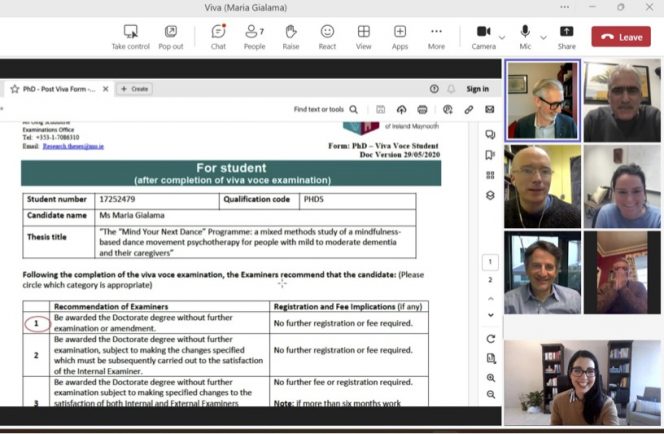
In the first quarter of 2024, six of our postgraduate students successfully defended their research theses. Warmest congratulations to Maria Gialama, Mohamed Maalim, Grainne McGinity, Christine Mulligan, Talent Nyamakope, Holly Wescott, and to their supervisory teams and supporters. We are very proud to showcase the work of [some of] our doctoral students (soon to be doctoral graduates) in this research spotlight and to highlight the diversity of career options in academic and non-academic sectors our postgraduate alumni pursue; MU Department of Psychology PhD graduates can be found in all walks of work-life and we are delighted to see their continuing contributions, achievements and successes.
If you are a graduate or postgraduate alum of the Department of Psychology at Maynooth University join our LinkedIn group for updates and events information; Maynooth Psychology Alumni | LinkedIn, you can also follow us on X: @MUPsychdept
Maria Gialama
Research Summary: At a time where the world’s population is ageing and people are living longer, there is an imperative need to ensure that they will be leading meaningful and fulfilling lives. Forty to fifty million people worldwide are currently living with dementia, making it a global health challenge not only for those living with the condition and their families, but also for wider health care systems and societies. The vast majority of PwD experience behavioural and psychological disturbances which can be associated with disease progression, hospitalisation, institutionalisation and increased morbidity, mortality and health care utilisation. As drug treatments for dementia are limited, researchers are increasingly seeking alternative ways to enable people with dementia to live well, using interventions to mitigate against function loss and improve symptom management (NICE, 2018). Informed by the UK’s Medical Research Council’s guidelines for developing complex interventions, Maria’s research focused on developing an innovative,multicomponent, non-pharmacological intervention based on mindfulness and dance movement psychotherapy for people with dementia and their caregivers (“Mind your Next Dance” MYND programme) and a protocol for a randomised controlled trial to assess the intervention’s feasibility, acceptability, and effectiveness. This interdisciplinary research, which was supervised by Prof. Mac MacLachlan and Dr. Joanne McVeigh (Department of Psychology, MU) and Prof. Georgios Hadjigeorgiou (Medical School, University of Cyprus) engaged an exploratory, sequential, mixed methods design, whereby qualitative data from in depth interviews and a focus group informed a (mainly) quantitative Delphi study. The findings suggested that the MYND programme can benefit PwD and their caregivers when implemented by competent professionals within a person-centred and human rights-based approach and when integrated in health care plans/community mental health services. Thus, Maria alongside the supervisory team is currently planning/ organizing the next phase of the research study that involves the implementation and evaluation of the MYND programme with a view to exploring its potential to promote meaningful engagement and enjoyment, reduce the frequency/severity of the behavioural and psychological disturbances associated with the condition and improve the QoL of PwD, whilst helping to reduce caregiver stress/burden. Maria’s study was supported by a Graduate Teaching Studentship award in the Department of Psychology (2017). Maria successfully defended her PhD and passed without corrections (photo from viva voce below).

Grainne McGinnity
Research Summary: Grainne's doctoral research aimed to enhance understanding of post-traumatic stress disorder (PTSD) and complex PTSD (CPTSD) as classified in the International Classification of Diseases, 11th Revision (ICD-11), using a refined measurement tool and in diverse population data (Ireland, U.K, U.S, Israel, Canada, Ukraine) The study confirmed the validity of the ICD-11 CPTSD model in a nationally representative Irish adult sample, identifying significant proportions meeting diagnostic criteria and linking specific symptom clusters to risk factors such as trauma exposure and loneliness. Among a sample of internally displaced people (IDPs) in Ukraine, rates of PTSD were notable, with avoidance coping prevalent. Additionally, higher levels of ADHD symptoms were found among Canadian adults with PTSD and CPTSD symptoms, particularly in individuals with CPTSD. Finally, age and gender differences in PTSD and CPTSD prevalence across various countries were observed, emphasizing the importance of considering these factors in understanding and managing trauma-related disorders globally. Overall, this research provides valuable insights into the validation, prevalence, and clinical correlates of ICD-11 PTSD and CPTSD, underscoring the need for a nuanced, international approach to trauma-related conditions.
Grainne is now working as a Post-Doctoral Researcher in St John of Gods service DETECT (Dublin East Early Treatment and Early Care) which is an early intervention service for people suffering with psychosis. She is currently conducting research on sex differences in care pathways and outcomes for people experiencing a first episode of psychosis. She is also getting clinical experience working with service users and hoping to apply for doctorate training in clinical psychology in 2024. Grainne’s doctoral research was supervised by Professor Philip Hyland.

Mohamed Maalim
Research Summary: Supervised by Prof. Malcolm MacLachlan, Mohamed’s PhD research ventured into enhancing assistive technology accessibility and was oriented around the systemic challenges and personal barriers faced by individuals with disabilities. Through a pragmatic explorative mixed-methods design, including Delphi methodology, Mohamed developed the Assistive Technology Passport framework. Integral to this framework is the central placement of the person at the heart of service provision, ensuring that AT services are not just accessible but also person-centred. The AT Passport is dynamically adaptive, making significant systemic recommendations for service provision and recognising the importance of aligning services with the user's evolving needs and contexts.
Mohamed currently holds a multi-faceted role at Stewarts Care, encompassing the Pilot Research Programme Lead, Project Lead on Digital Assistive Technology (DAT), and Senior Occupational Therapist. This composite position allows him to directly apply my research insights into practice directly, shaping innovative solutions for AT accessibility. Funded by the HSE CREATE FUND, Mohamed’s AT work contributes to Ireland's commitment to advancing AT initiatives. With a vision to publish and advance the conceptual model developed during his PhD, Mohamed sees himself in as a prominent advocate and leader in the assistive technology domain, driving policy and systemic change to ensure technology inclusivity on a global scale.

Talent Nyamakope
Research Summary: Talent’s thesis was titled ‘Factors influencing self-medicating with codeine in pain management - an exploratory cross-sectional and longitudinal qualitative research study’. The research focused on exploring the factors that influence use of over-the-counter codeine-based analgesics in pain management within an Irish context. This was achieved by 1. exploring the views and experiences of pharmacy professionlas on their interactions with codeine consumers in pain management, and 2. exploring the experiences of individuals living with chronic pain and self-medicating with codeine-based analgesics overtime. Findings highlighted how; 1. environmental factors (access to healthcare, quality of healthcare, classification of OTC analgesics and relationships with healthcare providers), 2. social factors (socio-economic status, psychosocial support, and social influences) and 3. individual factors (health status, knowledge and experience, psychological stability, and motivation and beliefs) pose as risk or protective factors to self-medicating with codeine in pain management. The current organisation and delivery of care in Ireland and the availability of codeine as an over-the-counter analgesic are risk factors to codeine misuse in pain management.
“The motive to embark on doctoral research came from being a healthcare professional with a passion to understand what influences health decisions in illness management in order to promote effective support in health settings. Completing this research equipped me with the necessary skills required to foster positive change through evidence-based approaches in health interventions. During my research studies, I was privileged to progress in my career from a community pharmacy healthcare professional to being appointed a health development officer on the Sláintecare health reform programme in Ireland. The research experience I gained is central to my current role as it focuses on reducing health inequalities through evidence-based health interventions. I now look forward to developing my career and aspire to get involved in more health services research that inform and shape healthcare policies and implementation of health practices going forward”.
Talent’s research was supervised by Professor Deirdre Desmond.

